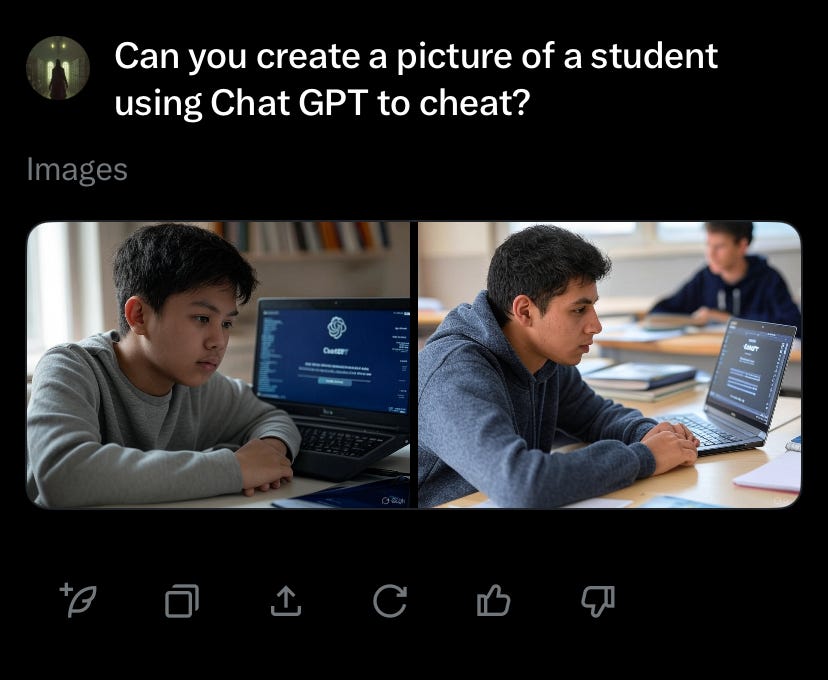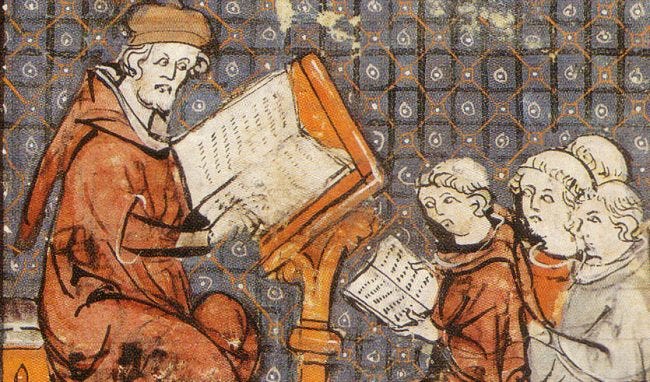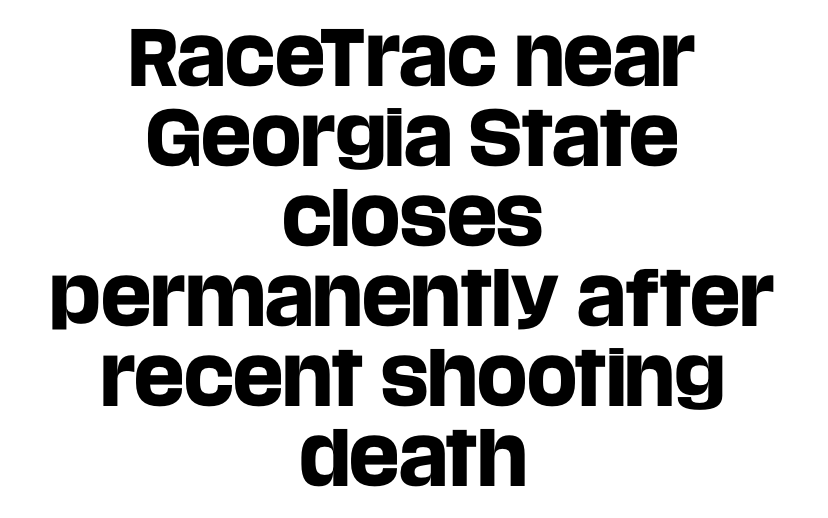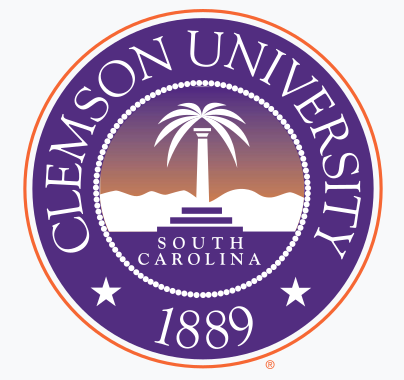Everyone can sense it. Though it is a mighty edifice, the university has neglected its foundations, which have so thoroughly rotted away that the whole thing will collapse under its own weight. This is true of education more generally as well; the K-12 system with which we are all as familiar as the air has the same problem. While there are isolated pockets of excellence, they are few and far between and subject to the same pressures. There is a great fall coming.
Many people point to AI as both problem and solution. As a nail in the coffin, it’s fairly plausible. I teach online classes, and Chat GPT has essentially made them meaningless. A huge percentage of my students simply do not do their own work at all. I have no way to prove that they’re cheating beyond the fact that it’s obvious to anyone who is a careful and experienced reader, but with no empirical way of demonstrating that, I am forced to treat their essays as legitimate. Even if I were to take a more aggressive approach and call them out, the schools wouldn’t stand for it. I’ve been let go from a job over that very issue. They didn’t say that was the reason; as an adjunct with temporary status, no one owes you a reason for anything, but that was the only place I did it (it was particularly blatant there) and the only time I’ve just been dropped.
Of course, if they haven’t already, some company will figure out a way for AI to detect AI with more perfect accuracy, such that Chat GPT essays will be more easily found out. But programs that can analyze texts to that degree will necessarily be able to evaluate them according to fixed criteria, which will naturally lead to their adoption by universities for instructional purposes. In other words, AI will replace me, the teacher, just as it replaced the students. The latter will in turn learn to game the system and hit the exact points expected of them that will signal quality to the program. AI will both produce and evaluate its own work without any need for human inputs.
I asked AI to create a picture of cheating using AI. It gave me an Asian and an Indian. Meta commentary from Grok?
It will replace us, but we will all still be there, in a manner of speaking. While it lasts, there will still be an avatar on each end, an identity connected to a real human being, for whom the results of this activity will manifest in some way. The student on one side of the artificial process will be acknowledged to have a credential that grants him access to further opportunities, whereas the teacher will be treated by the system as though he has taught and given some small share of the revenue from the student, by way of the state. Any sense of a personal relationship will have been squeezed out in the name of efficiency, to the point that-for example- even my emails are pre-written by my department. I received word from one school I work for that they will now be homogenized across the entire school, along with the syllabi, calendars, and classroom policies. Academic freedom causes unnecessary frictions, and it makes the students happy, since they expect their classes to be as predictable as their trips to McDonalds.
Like clockwork
People are happy this awful reality is coming to an end, though I suspect it will limp along for longer than many expect. The inertia of nearly two decades of expectations per young person is not so easily diverted into other channels. Kids are groomed for the current system, and barring some great disruptive event, they will be fed into the credentialist arm of neoliberalism with the firm assurance that, whatever else might await on the horizon, getting your name on the right piece of paper can still open doors. Everyone ‘knows’ that college represents a vast waste of time but also knows that not going essentially obviates entering the middle class for any but the most talented and enterprising- or lucky.
I mentioned AI as a solution. Some people think that will be the case, that Grok makes it easy to learn, and thus, people will get whatever skills they need on their own, for free, and that will render the university extinct. I agree that that is theoretically possible, but I can say for certain that it will not come to pass as its boosters seem to think. I’m old enough to remember the 90s, when the World Wide Web was going to revolutionize everything, print was dead, etc. I also remember that people discovered you could send naked pictures online and the new Renaissance never quite manifested. AI makes it easy to learn. It makes it even easier not to learn. You will need a new humanity before autodidacticism becomes any kind of default, even with economic incentives.
“I was there, Gandalf, 30 years ago, when men had the chance to end evil once and for all, but chose downloadable nudes instead…”
-Elrond of AOL
But I can see in a sense where AI might lead. There is no constructing a new economic order without addressing the central role played by colleges in providing credentials. The Trump administration rightly sees the existing order as a threat and understands the role that the university system plays in that. His attacks on DEI, his removal of federal funding, his decrees against disparate impact as a legal theory, and sundry other actions point to an endgame where legislation is put into place mandating alternative demonstrations of qualifications for jobs apart from a college degree. IBM will be able to create its own tests for coders without having to worry about Griggs v. Duke Power. Here, AI might step in to give qualitative and quantitative assessments free from human prejudice, fine-tuned for specific needs.
This would break the back of the university as a cog in the machine. Potential students will realize that they can have ‘the college experience’ drinking at home, and figure out the most efficient ways of maximizing their chances at the jobs they want. For some fields, this will require specific classes, for others, self-study. Combined with the new emphasis on industrial technology and trades that the economic policies of the administration are emphasizing, this will make education options much more diverse in the very near future.
What does this mean for colleges? Superficially, it means destruction. My job(s) as an adjunct will all disappear. Along with me will go a whole range of useless rent-seekers, a parasitic administrative class who will have to test the market value of diversity and inclusion coordination. It would hurt, but so much the better.
I could go back to work for my former employer, Satan.
But on a more fundamental level, it will allow something new to emerge, which, paradoxically, will be more like what once was. Disencumbered of the yoke of neoliberalism, of being the plowhorse of careerism, colleges will be far more free than they have been in ages. But far from being put out to pasture, there will be great spaces to roam. I’ve written about the future of education many times, but I think it’s useful to reflect on its past as well.
Colleges as we know them today are a product of the Middle Ages. College comes from the Latin collegium, which had a far greater range of meaning than today. A collegium was any sort of formal association- a guild, a social club, or some special-purpose body. The broader idea lingers on in things like the College of Cardinals or the Electoral College (my students will often assume the latter has something to do with education). A collegium is a brotherhood.
“Turn to chapter four of Aristotle’s Metaphysics and begin queering it until all the settler colonialism has been unpacked.”
In the sense we generally understand it today, some of these collegia became associations of scholars, who came together to pool knowledge and resources, sharing ideas and books, which were then hard to come by. Tuition-paying students made it possible for scholars to pursue the life of the mind full-time, and the students in turn hoped to enter the Church and the expanding bureaucracies of the centralizing medieval kingdoms. The emphasis was never on mere job-training, however. Much like the successive dynasties of China assumed that a knowledge of Confucian philosophy equipped a man to maintain dikes or suppress bandits, the medievals took it as an article of faith that the liberal arts were the necessary foundation of a useful professional. It was, from the outset, a profoundly middle-class enterprise and remains so today.
It was in the Renaissance that the idea of the educated gentleman found its fullest expression. The son of a wool merchant or a vinter or even a peasant could ennoble himself through a formative process of cultivation. This involved humbling oneself before the legacy of the Classical world interpreted through the lens of a normative Christianity, a vision that combined the best of the wise pagans with revealed truth. It had as its highest goal the manifestation of eternal beauty in transient human life. It never was, nor could it ever have been or ever be, fully what it aspired to, but it was a vision of excellence that would animate scholarship for centuries.
The man who made this never attended a formal college. Instead, he was a member of the circle around Lorenzo di Medici, the Florentine Academy, where he breathed the very air of scholarship. He was 24, and at the beginning of his career.
It’s important to note that colleges, soon joined together under the umbrella organizational principle of the university, were a major part in this, but that that path was not exclusive. Academia was not confined to specific places and people. One could spend one’s life at Bologna or the Sorbonne reading Aristotle, or one could have a year’s polish at a hedge-school and spend a lifetime as a country scholar-priest. It mattered less where you attained your cultivation than that it was evident in your very being.
All of this was true until the late 19th century, when managerialism first arose as the solution to economic changes resulting from the Industrial Revolution. Men now had to adapt themselves to networks of systems, which required efficiencies and homogenization to be effective. Education became not a process but a product, the end result of specific inputs upon a fungible humanity. Much has been written about the process and we live with the final result, a sprawling, bloated monstrosity, spectacularly wasteful of material and human capital. Modern college is a shell of what it once was.
Better a Shell than a RaceTrac, especially this cursed location in the heart of Atlanta’s vibrant diversity.
And yet, I loved it. This is supposed to be the place where I grouse about the insane politics and the backbiting petty intrigues and the careerist, anti-intellectual atmosphere. I saw all of those things. But I also saw through them.
I grew up in an environment where it was never expected that I go to college, and on top of that, I wasn’t a good student. I was, however, a great reader. When I did decide to go to college I would never have been accepted anywhere were it not for my SAT scores. The irony of my love of learning meaning nothing to schools while being saved by standardized testing is not lost on me. I entered a world I wasn’t ready for and I never knew quite what to do. I enrolled at first in a community college, but it bored me, so I only went intermittently while I worked at the same hotel that had employed me since I was 16. One day, some friends who attended college in a different town told me about this great class they had about the Byzantine Empire. As I was fascinated by it, I enrolled there on a whim.
The professor who taught the class left before I got there, but I stayed on anyway. It was better than the community college, but not by much. The students were largely indifferent, but there were some excellent professors who looked out for me. I became serious about scholarship and stayed on for graduate school, in the course of which it became apparent that I needed more grounding in Ancient Greek. So I went over as a transient to the big flagship state school, only intending to take a few supplemental undergraduate classes.
I ended up staying three years, and studying not only Classics, but religion as well. It was a revelation. For the first time in my life I wasn’t the only one in the classroom with his hand up. The other students really cared, and the environment was charged with intellectual energy.
Of course, even as I write that, I have no doubt that if you found someone else who was there at the same time, he might very well give a wholly contrary account of the university. It was a major SEC college with a famous football program; it was widely seen as a party school, and the only ones not obviously having boozy fun were the ubiquitous blue haired malcontents. I get why someone else might go through that and come out the other end resenting it.
It wasn’t this one. I tried to get in, but I didn’t know enough about cows to pass the entrance exam, and the dean called me a fag for wearing shoes on a weekday.
Not me though. Those were the happiest years of my life. I was broke. I was living with my mom. I was teaching college classes in different parts of the state, such that I had a three hour plus circuit to drive three days a week. Greek was hard and I didn’t take to it right away, not like my classmates, younger people from private schools who already had years of Latin. I wasn’t even able to finish, as I ran out of money and was only just able to return to my old school and finish my MA in history. But I have no regrets.
There was a garden near the building where they taught Classics. I used to sit there every day before class. It was a beautiful old Victorian place, maintained by the environmental design students. I would study my Greek and my texts and ponder with nothing but the faint course of the fountain to disturb my peace. You could see it there, the reality beyond the miserable grade grubbing and venal networking, through the stultifying fog of managerialism. You could see the real college.
If you know, you know.
They were there with me, the ones who came before, the ones who would come after. College is a brotherhood, one of the mind, of ideas. It thus has the property of transcending the immediate, the prosaic, and ephemeral. At one end sits Moses and Pythagoras, at the other, some nameless sage yet to be born. And in the middle is me, and all the people who cared enough to join me.
There’s a truth they don’t tell young men, something that we all come to realize at some point, sometimes long after our youth has departed. The great run of us are superfluous. The world will turn whether we’re on it or not, and we can and generally will be tossed aside regardless of what we can offer. Indeed, it’s those who want the most who most trouble the system. In the face of mechanized indifference to excellence a man must make a choice whether to accept mediocrity or walk a lonely path. College, that true, deep, transcendent collegium, taught me that I wasn’t alone, that there were thousands of years of people like me. I don’t have to be what the world wants me to be, so long as I’m prepared to struggle and suffer. That’s the real tuition, and the only true test.
With every mercenary reason to go to college gone, all that will remain is the only one that ever should have mattered. Men will still form collegia, they will seek out the like-minded for fellowship regardless of how autodidactic they fancy themselves. What remains will be stripped down, as it should be, to its old core. And just maybe, the world will rediscover the value of it all, that the life of the mind is needed.
If I had a few million dollars, I would buy a spot near that garden and spend the rest of my life taking classes. I’d study Medieval literature; I’d learn Hebrew and Aramaic. I’d read Khayyam in Persian. I’d write books about all sorts of things. It would be a life well-spent. So kindly consider becoming a paid subscriber. I’m only a few million away from living the dream.












This really hit home. I went through a strong academic program at a top school for my major (not an Ivy, but elite in its domain). Yet what shaped me most wasn’t the coursework—it was the environment. Specifically, the mentors I met—men who weren’t just instructors, but gatekeepers into deeper traditions.
One of them initiated me into what you might call a Sacred Network of Excellence—a living brotherhood whose roots trace back to Los Alamos and the Manhattan Project, ARPANet, and other quiet fellowships within the old defense world. Through him, I didn’t just gain a deeper sense of mission—I eventually found my way to the Church.
Another mentor connected me to the Great Books lineage of Mortimer Adler and the University of Chicago. That intellectual inheritance—classical, ordered, humane—shaped me profoundly and is a key reason I am here commenting today.
None of that came from a syllabus. It came from people. Real education is not content delivery—it’s transmission of soul. It’s about being invited into a tradition and tested in its discipline. What you’ve written reminds us that while the institution is collapsing, the collegium still lives—and it still calls men to join it.
When we rebuild what comes next, it can’t just be an “alternative university.” It must be a sacred brotherhood of excellence—formed in pursuit of truth, forged in mutual respect, and rooted in something eternal. That’s the real university. That’s what we lost. And that’s what we need to recover.
I came to enjoy reading later in life, in my early twenties, and to the classics even later, in my late twenties. I didn't hate high school or college, but I was bored...all the time.
Once I started reading in earnest I entered a graduate literature program in my early thirties. Absolutely loved that experience. Got to read things I wanted to and had some interesting professors.
Much later after that I had to change careers and took web development classes in my late forties. Again, loved that school experience as it was what I wanted to do, not what I was made to do.
It gives me pause to think about the hundreds and hundreds of hours I sat bored in classrooms, unchallenged intellectually and have always wondered in what ways that may have stunted my intellectual and creative development and in what ways it still affects me today. We homeschooled my son, one of the best decisions we've ever made.